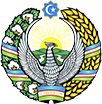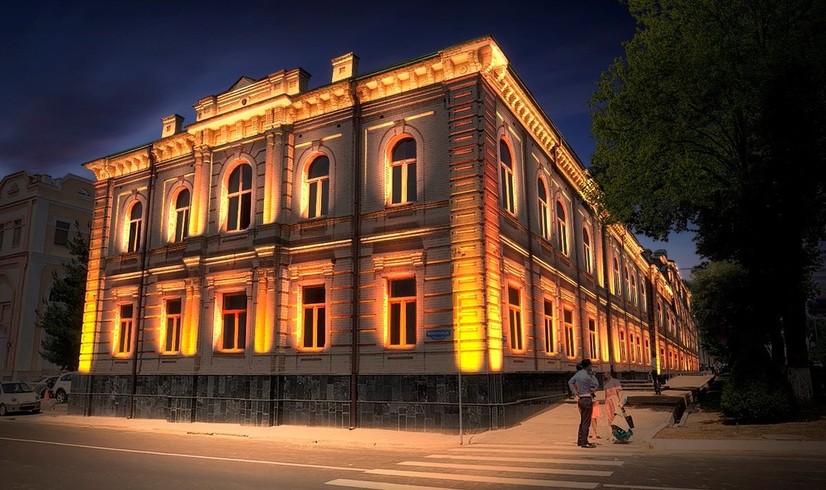University Overview
Faculties Departments Centers Sections Faculties Legal clinic Student dormitory Academic Lyceums under TSULPurchases
Announcement Report for the 1st half 1 - 2022 Quarterly Report 2 - 2022 Quarterly Report 3 - 2022 Quarterly Report I-quarter of 2023 II-quarter of 2023 III quarter of 2023 2025 - yil I-chorak hisoboti Report for the 2nd quarter of 2025 Report for the 3rd quarter of 2025 2024 Financial Report 2023 Financial Report 2021 Financial Report Report for the IV Quarter of 2025Staff
VacanciesContact
Phone bookOverseas internship and short-term courses
Internships for academics Internship for doctoral students and independent researchers Summer and winter schoolsInternational cooperation with national and international NGOs, charitable organizations and other structures
I-II quarter 20244. QUALITY EDUCATION
Working with schools5. GENDER EQUALITY
Women in Science
- Rector greetings
- Objectives and values
- Reports and presentations
- Logo
- Museum
- Mission of the university
- Strategic directions of the university development
- Environmental Sustainability
- Green University
- Images of the university
- Faculties
- Departments
- Centers
- Sections
- Faculties
- Legal clinic
- Student dormitory
- Academic Lyceums under TSUL
- Board
- Rector
- Vice-rectors
- Leadership reception
- Справочный анализ
- License and accreditation
- Statute
- Primary regulations
- Local acts
- Anti-corruption
- Statistics
- University ranking
- Announcement
- Report for the 1st half
- 1 - 2022 Quarterly Report
- 2 - 2022 Quarterly Report
- 3 - 2022 Quarterly Report
- I-quarter of 2023
- II-quarter of 2023
- III quarter of 2023
- 2025 - yil I-chorak hisoboti
- Report for the 2nd quarter of 2025
- Report for the 3rd quarter of 2025
- 2024 Financial Report
- 2023 Financial Report
- 2021 Financial Report
- Report for the IV Quarter of 2025
- Vacancies
- Phone book
University
About the university
University
University Overview
Management organs
Appeals
Official documents
Open Data
Achievements
Purchases
Staff
Contact
Stakeholder engagement policy
- List of graduates
- Our graduates
Education
Undergraduate programs
Graduate programs
Stipend and scholarships
The electronic library
Course schedule
Distance learning
Additional professional education
Final state attestation
Law clinic Street Law
Street Law
Training program
Syllabus
Qualification requirements
Employment and careers
Center for professional legal training by international standards
Our expert advice to local
TSUL Experts
Graduates
Stipend and scholarships
The electronic library
Course schedule
Distance learning
Additional professional education
Final state attestation
Law clinic Street Law
Street Law
Training program
Syllabus
Qualification requirements
Employment and careers
Center for professional legal training by international standards
Our expert advice to local
TSUL Experts
Graduates
Course schedule
Distance learning
Additional professional education
Final state attestation
Law clinic Street Law
Street Law
Training program
Syllabus
Qualification requirements
Employment and careers
Center for professional legal training by international standards
Our expert advice to local
TSUL Experts
Graduates
Additional professional education
Final state attestation
Law clinic Street Law
Street Law
Training program
Syllabus
Qualification requirements
Employment and careers
Center for professional legal training by international standards
Our expert advice to local
TSUL Experts
Graduates
Law clinic Street Law
Street Law
Training program
Syllabus
Qualification requirements
Employment and careers
Center for professional legal training by international standards
Our expert advice to local
TSUL Experts
Graduates
Training program
Syllabus
Qualification requirements
Employment and careers
Center for professional legal training by international standards
Our expert advice to local
TSUL Experts
Graduates
Qualification requirements
Employment and careers
Center for professional legal training by international standards
Our expert advice to local
TSUL Experts
Graduates
Center for professional legal training by international standards
Our expert advice to local
TSUL Experts
Graduates
TSUL Experts
Graduates
- Directory of scientific schools
- General information
- Participation in rankings
- Media about ratings
- Results of entrance exams
- List of questions
- Naoshi Sugiyama
Scientific and innovative activity
Scientific activity
Scientific panel
Science schools
Science schools
Scientific publications
Council of Young Scientists
Scientific fund
Academic Innovation Fund
Legal Tech Laboratory
Commercialization of scientific and innovative developments
Legal Initiatives
TSUL in international rankings
Scientific fund
Academic Innovation Fund
Legal Tech Laboratory
Commercialization of scientific and innovative developments
Legal Initiatives
TSUL in international rankings
Legal Tech Laboratory
Commercialization of scientific and innovative developments
Legal Initiatives
TSUL in international rankings
Legal Initiatives
TSUL in international rankings
Qualifying Exams
Scientific research results
Services
Central Asian Legal Research Fellowship (CALR) scientific partnership program
Grants under state scientific and technical programs
Patents
Code of academic integrity and research ethics
Сonference materials on law
Doctoral studies (DcS) and basic doctoral studies (PhD)
Services
Central Asian Legal Research Fellowship (CALR) scientific partnership program
Grants under state scientific and technical programs
Patents
Code of academic integrity and research ethics
Сonference materials on law
Doctoral studies (DcS) and basic doctoral studies (PhD)
Grants under state scientific and technical programs
Patents
Code of academic integrity and research ethics
Сonference materials on law
Doctoral studies (DcS) and basic doctoral studies (PhD)
Code of academic integrity and research ethics
Сonference materials on law
Doctoral studies (DcS) and basic doctoral studies (PhD)
Doctoral studies (DcS) and basic doctoral studies (PhD)
Research assistantships
Honorary professors
- Overseas universities- partners
- International organizations - partners
- Membership in international associations
- International Olympiads and competitions
- Overseas professors
- Foreign internships
- Joint programs
- Foundation Program
- Student exchange
- Faculty exchange program
- Joint faculty
- Reports on foreign internship— 2023
- Reports on foreign internship— 2024
- Reports on foreign internship— 2025
- International conferences, seminars and round tables
- International scientific projects and scholarships
- Panel of experts (compatriots)
- International stipends
- Partner university stipends
- Internships for academics
- Internship for doctoral students and independent researchers
- Summer and winter schools
- I-II quarter 2024
International relations
International relations
academic mobility
Scientific projects
Overseas internship and short-term courses
Central Asian Student Congress
International cooperation with national and international NGOs, charitable organizations and other structures
Student life
Social immersion
Student clubs
Creative studios and clubs
Student’s union
Scientific schools and circles
Student festivals
Stipends
Olympiads
Students' hostel
Medical Center
Dining facilities
Bookstore
Youth Union at TSUL
Youth Parliament
Spirituality
Ekofaol talabalar
Social activity index
Register of active students
A Step Toward the Future
Creative studios and clubs
Student’s union
Scientific schools and circles
Student festivals
Stipends
Olympiads
Students' hostel
Medical Center
Dining facilities
Bookstore
Youth Union at TSUL
Youth Parliament
Spirituality
Ekofaol talabalar
Social activity index
Register of active students
A Step Toward the Future
Scientific schools and circles
Student festivals
Stipends
Olympiads
Students' hostel
Medical Center
Dining facilities
Bookstore
Youth Union at TSUL
Youth Parliament
Spirituality
Ekofaol talabalar
Social activity index
Register of active students
A Step Toward the Future
Stipends
Olympiads
Students' hostel
Medical Center
Dining facilities
Bookstore
Youth Union at TSUL
Youth Parliament
Spirituality
Ekofaol talabalar
Social activity index
Register of active students
A Step Toward the Future
Students' hostel
Medical Center
Dining facilities
Bookstore
Youth Union at TSUL
Youth Parliament
Spirituality
Ekofaol talabalar
Social activity index
Register of active students
A Step Toward the Future
Dining facilities
Bookstore
Youth Union at TSUL
Youth Parliament
Spirituality
Ekofaol talabalar
Social activity index
Register of active students
A Step Toward the Future
Youth Union at TSUL
Youth Parliament
Spirituality
Ekofaol talabalar
Social activity index
Register of active students
A Step Toward the Future
Spirituality
Ekofaol talabalar
Social activity index
Register of active students
A Step Toward the Future
Social activity index
Register of active students
A Step Toward the Future
A Step Toward the Future
Admission 2025
Admission office
Bachelor's degree
Master's degree
Admission to study on the basis of joint educational programs
Admission of graduates of law colleges
Admission of foreign citizens
Announcements related to the admission process
Admission of graduates of law lyceum
The issues of transfer and restoration of study
Admission of blind applicants
The results of the interview for the admission to training of citizens with at least five years of experience in the sectors of the economy
Toshkent davlat yuridik universitetiga 2025/2026-o'quv yili uchun tabaqalashtirilgan to'lov-kontrakt miqdorlari
Master's degree
Admission to study on the basis of joint educational programs
Admission of graduates of law colleges
Admission of foreign citizens
Announcements related to the admission process
Admission of graduates of law lyceum
The issues of transfer and restoration of study
Admission of blind applicants
The results of the interview for the admission to training of citizens with at least five years of experience in the sectors of the economy
Toshkent davlat yuridik universitetiga 2025/2026-o'quv yili uchun tabaqalashtirilgan to'lov-kontrakt miqdorlari
Admission of graduates of law colleges
Admission of foreign citizens
Announcements related to the admission process
Admission of graduates of law lyceum
The issues of transfer and restoration of study
Admission of blind applicants
The results of the interview for the admission to training of citizens with at least five years of experience in the sectors of the economy
Toshkent davlat yuridik universitetiga 2025/2026-o'quv yili uchun tabaqalashtirilgan to'lov-kontrakt miqdorlari
Announcements related to the admission process
Admission of graduates of law lyceum
The issues of transfer and restoration of study
Admission of blind applicants
The results of the interview for the admission to training of citizens with at least five years of experience in the sectors of the economy
Toshkent davlat yuridik universitetiga 2025/2026-o'quv yili uchun tabaqalashtirilgan to'lov-kontrakt miqdorlari
The issues of transfer and restoration of study
Admission of blind applicants
The results of the interview for the admission to training of citizens with at least five years of experience in the sectors of the economy
Toshkent davlat yuridik universitetiga 2025/2026-o'quv yili uchun tabaqalashtirilgan to'lov-kontrakt miqdorlari
The results of the interview for the admission to training of citizens with at least five years of experience in the sectors of the economy
Toshkent davlat yuridik universitetiga 2025/2026-o'quv yili uchun tabaqalashtirilgan to'lov-kontrakt miqdorlari
- Working with schools
- Women in Science
SDG
1. NO POVERTY
2. ZERO HUNGER
3. GOOD HEALTH AND WELL-BEING
4. QUALITY EDUCATION
3. GOOD HEALTH AND WELL-BEING
4. QUALITY EDUCATION
5. GENDER EQUALITY
6. CLEAN WATER AND SANITATION
7. AFFORDABLE AND CLEAN ENERGY
8. DECENT WORK AND ECONOMIC GROWTH
9. INDUSRY, INNOVATION AND INFRASTRUCTURE
10. REDUCED INEQUALITIES
11. SUSTAINABLE CITIES AND COMMUNITIES
12. RESPONSIBLE CONSUMPTION AND PRODUCTION
13. CLIMATE ACTION
14. LIFE BELOW WATER
15. LIFE ON LAND
16. PEACE, JUSTICE AND STRONG INSTITUTIONS
17. PARTNERSHIPS FOR THE GOALS
8. DECENT WORK AND ECONOMIC GROWTH
9. INDUSRY, INNOVATION AND INFRASTRUCTURE
10. REDUCED INEQUALITIES
11. SUSTAINABLE CITIES AND COMMUNITIES
12. RESPONSIBLE CONSUMPTION AND PRODUCTION
13. CLIMATE ACTION
14. LIFE BELOW WATER
15. LIFE ON LAND
16. PEACE, JUSTICE AND STRONG INSTITUTIONS
17. PARTNERSHIPS FOR THE GOALS
10. REDUCED INEQUALITIES
11. SUSTAINABLE CITIES AND COMMUNITIES
12. RESPONSIBLE CONSUMPTION AND PRODUCTION
13. CLIMATE ACTION
14. LIFE BELOW WATER
15. LIFE ON LAND
16. PEACE, JUSTICE AND STRONG INSTITUTIONS
17. PARTNERSHIPS FOR THE GOALS
12. RESPONSIBLE CONSUMPTION AND PRODUCTION
13. CLIMATE ACTION
14. LIFE BELOW WATER
15. LIFE ON LAND
16. PEACE, JUSTICE AND STRONG INSTITUTIONS
17. PARTNERSHIPS FOR THE GOALS
14. LIFE BELOW WATER
15. LIFE ON LAND
16. PEACE, JUSTICE AND STRONG INSTITUTIONS
17. PARTNERSHIPS FOR THE GOALS
16. PEACE, JUSTICE AND STRONG INSTITUTIONS
17. PARTNERSHIPS FOR THE GOALS

- E-Library
- E-university
- Distance learning
- Schedule of lessons
- For international students
- Scholarships and grants
- Student Services Center
- Street Law
- Academic mobility
- Foreign academics
- Trainings and non-degree programs
- Clubs and clubs, workshops and festivals
- Ask a Question
- Ways to fight corruption
- Educational grants
- Toshkent davlat yuridik universitetida kiyinish tartibi
Current students
About the University
Tashkent State University of Law (TSUL) is the leading higher education and scientific-methodological institution in Uzbekistan for training legal professionals.
The history of the university is closely linked with the development of the national school of law in our country, as well as with the names of prominent legal scholars who made significant contributions to the formation of national legal science: Khadicha Suleymanova, Khojiakbar Rakhmonkulov, Boris Blinder, Georgiy Sarkisyans, Anvar Agzamkhodjaev, Shavkat Urazayev, Shoakbar Shoakhmedov, Gafur Abdumajidov, Ikrom Zakirov, and many others.
On August 15, 1991, according to the resolution of the Cabinet of Ministers, Tashkent State University was transformed into Tashkent State Institute of Law.
On June 28, 2013, in accordance with the decree of the President of the Republic of Uzbekistan No. PQ–1990, the Tashkent State Institute of Law was transformed into Tashkent State University of Law (TSUL).
Since its establishment as an independent educational and research institution, the university has preserved longstanding traditions while actively implementing new pedagogical technologies in the educational process. The university conducts fundamental and applied research on current issues of legislation and its application, and carries out a wide range of educational and outreach activities aimed at enhancing legal awareness and legal culture in society.
TSUL trains specialists at the levels of bachelor's, master's, doctoral, and independent research programs.
According to the decree of the President of the Republic of Uzbekistan No. PF–5987 of April 29, 2020, “On Additional Measures for the Radical Improvement of Legal Education and Science in the Republic of Uzbekistan,” the organizational structure of TSUL was revised, and new faculties and structural units were established.
Currently, the university has six faculties:
-
Faculty of Public Law
-
Faculty of Criminal Justice
-
Faculty of Private Law
-
Faculty of International Law and Comparative Jurisprudence
-
Faculty of Master's and Distance Learning
-
Faculty of Joint Educational Programs
Within these faculties, new departments and centers have been created, including: the Department of Constitutional Law, the Department of Administrative and Financial Law, the Department of Courts, Law Enforcement Agencies and Advocacy, the Department of Forensics and Judicial Expertise, the Center for Japanese Law Studies, and the Center for German Law and Comparative Legal Studies.
The university currently has 21 departments. As of September 2025, the university's research potential stands at 53.9%. Over the next three years, measures are being implemented to increase the research potential to at least 70% through support of scientific research.
As of today, TSUL employs 482 academic staff (internal and external), of whom 260 hold academic degrees: 94 Doctors of Science (DSc), 166 Candidates of Science and PhDs, 78 professors, and 88 associate professors.
The educational process at the university is organized according to the credit-module system, which is new for the country.
The European Credit Transfer and Accumulation System (ECTS) has been introduced, allowing students to choose courses independently.
Since the 2020/2021 academic year, admission to distance learning programs in bachelor's and master's studies has been conducted.
Joint educational programs providing a double degree are also being implemented at the university.
Currently, TSUL has 9,826 undergraduate students and 443 graduate students. Classes are conducted in Uzbek, Russian, and English.
Within joint educational programs, agreements have been reached for training bachelor students in International Private Law with Yanka Kupala State University of Grodno (Belarus) and in International Economic Law with KAZGUU University named after M.S. Narikbayev (Kazakhstan). Negotiations are also ongoing for joint programs with Beyazid Yildirim University (Ankara, Turkey) and Warsaw University (Poland).
To ensure transparency and convenience for students and faculty, the E-University platform has been launched, digitizing the educational process: class scheduling, exams, grading, student ranking, and electronic document management. This platform allows students, their parents, and the general public to monitor and participate in all processes, ensuring openness and transparency.
Combating corruption is one of the university's top priorities. In this regard, an Anti-Corruption Plan has been adopted, an Anti-Corruption Commission established, and a Code of Ethics developed. Feedback mechanisms for reporting corruption, systematic student surveys on corruption issues, and public oversight of the examination process are being implemented.
At the master's level, TSUL trains specialists in the following fields (duration – 1 year):
-
Advocacy
-
International Arbitration and Dispute Resolution
-
Sports Law
-
Public Administration Law
-
Corporate and Business Law
-
Labor Law
-
Theory and Practice of Criminal Law Enforcement
-
Intellectual Property and Information Technology Law
-
Natural Resources Law
-
Financial and Legal Monitoring
-
Mediation and Alternative Dispute Resolution
-
Anti-Corruption and Compliance Control
-
Media Law
-
International Commercial Law
-
Cyber Law
-
International Law and Human Rights
-
Legal Branches and Legal Analysis


